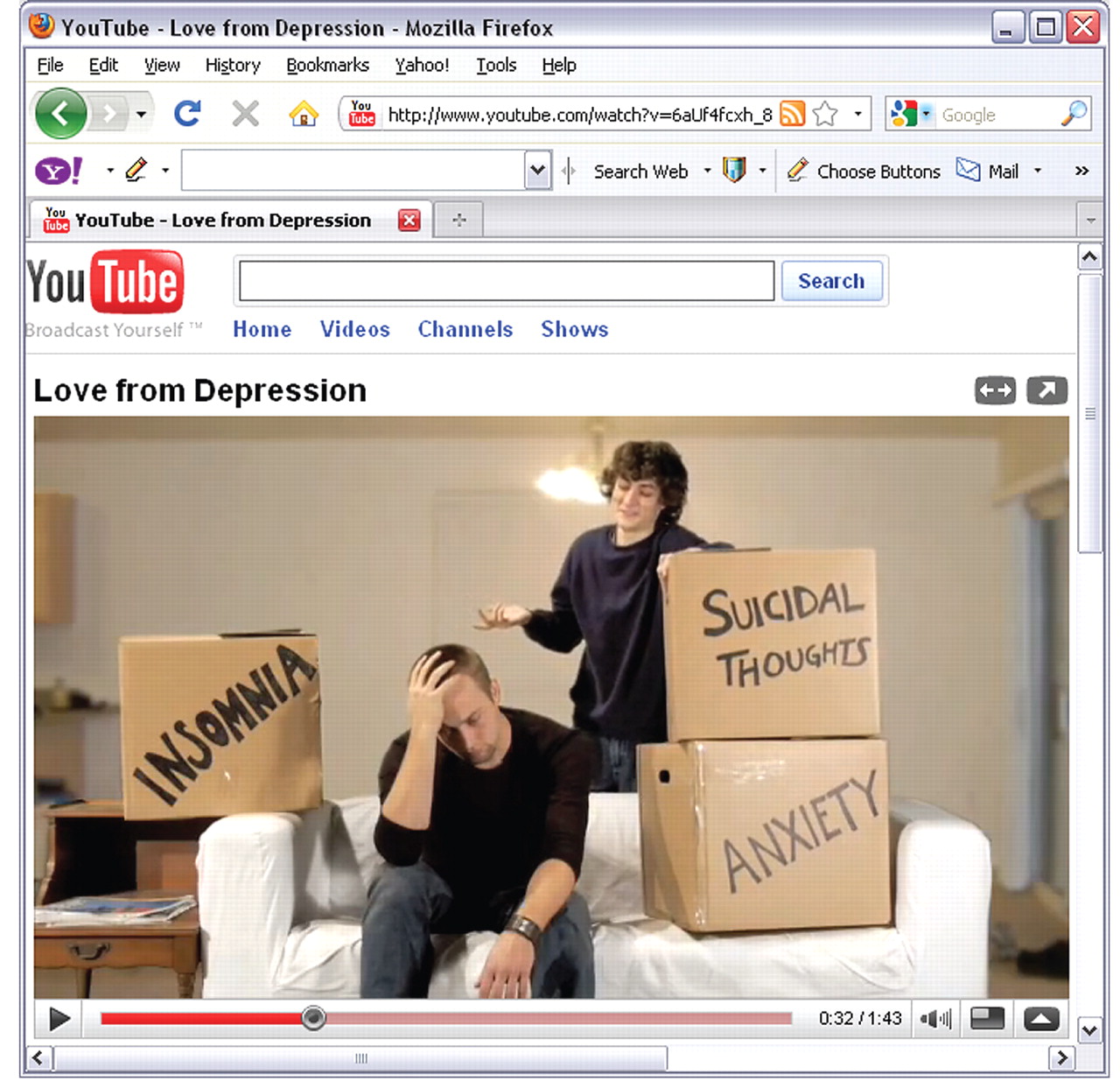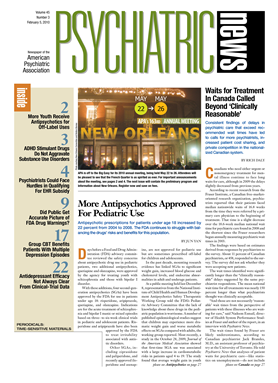The two young men in a recent YouTube video may be interchangeable with participants in any of the millions of such online skits posted on the site each year. But their humorous interactions had a serious message that stands out on a Web site known for showcasing outrageous behavior.
As the two sit side by side on a couch, one of the men in his early 20s stares forlornly while the other tells the camera: “I was just gonna stay with him for like a week after he broke up with his girlfriend, but it's just been so awesome.”
The realization that this may be something different from the typical online video comes when the animated half of the duo continues: “I can keep him up at night. And ever since he got fired, we can spend the whole day together.”
The video's talkative character is a visual representation of the aggressive nature of clinical depression and its effects if left untreated.
The video is the latest project of a small group of psychiatrists in Maryland who have looked for innovative ways to educate the public about mental illness and the benefits of psychiatric care.
“This has increased our outreach to the public by several orders of magnitude,” said Mark Komrad, M.D., a leader of the Maryland Foundation for Psychiatry Inc., about its online educational efforts.
Members of the 18-year-old foundation have given many presentations about mental illness and the benefits of psychiatric care, but those audiences of several hundred have expanded to thousands of video views and page downloads of Web sites it has created in recent months. The group launched
lovefromdepression.com last summer, which includes a Web site, online videos, and a Facebook page that aim to educate college-age people, who have high rates of mental illness but frequently don't understand that they need help.
“For a small, nonprofit foundation, those are big numbers,” Komrad said.
‘Novel’ Efforts Used
The foundation, led by a 17-member volunteer board of directors, has relied primarily on donations from individual psychiatrists rather than endowment money to educate the public since 1991. One of nine state psychiatric foundations nationwide, the Maryland foundation operates on a $12,000 yearly budget. It can channel nearly its entire budget to outreach by virtue of its all-volunteer structure and through the use of in-house expertise.
For instance, Komrad is a former host of national radio and local television shows and helped create a series of one-minute informational advertisements about psychiatry and mental illness, including postpartum depression. The foundation had timed ads for the holiday season to discuss ways to avoid and reduce holiday stress, as well as radio spots on the mental health impact of the recession.
“The goal is to educate the public in novel ways about who we are and what we do,” Komrad said.
Efforts to reach that goal recently included a partnership with the Maryland Institute College of Art to use students in creating the online videos and Web sites that would appeal to youth while informing them about the possibility of mental illness in themselves or their peers.
“We could see why it would be an appealing idea for young people because it was coming from young people,” said Thomas Allen, M.D., secretary/treasurer of the foundation.
The foundation's site also includes mental-health-related news briefs and movie reviews “from a psychiatric perspective,” Komrad said.
Jonas Rappeport, M.D., president of the foundation, said his group decided to focus on young people recently because of worrisome health trends.
“We felt college suicide was a growing problem,” Rappeport said. “We hope that by seeing [the Web site and videos], they will better be able to see the signs of depression in their friends or themselves and get help.”
Outreach Targets Vary
The foundation has previously sought to improve mental health care for youth by approaching other clinicians. As part of an ongoing series of clinician meetings, the foundation coordinated a recent event for child psychiatrists and pediatricians that sought to educate each group about the mindset and approach to care of the other medical specialty.
“Sometimes child psychiatrists and pediatricians don't communicate with one another and work at cross-purposes,” said Joseph Bierman, M.D., a child psychiatrist who helped organize the event. “We thought that this program would be helpful in addressing that.”
The foundation also presents an annual award to honor innovative mental health programs. The award recognizes successful programs that can inspire others to improve the overall quality of mental health care in Maryland through the use of new approaches that reduce stigma or expand access to treatment.
The latest recipient of the foundation's Outstanding Merit Award was a program for young children with “social, emotional, and psychological challenges.” The Jenny Waelder Hall Nursery School, offered through the Baltimore-Washington Center for Psychoanalysis, uses a highly trained staff and small class sizes to offer special-needs children and their parents the additional supports they may require.
“It encourages them to keep doing what they are doing and to try new things,” Rappeport said about the foundation's award.
Previous foundation award recipients included a program in “a high-drug-use area” of Baltimore that provided treatment to people with co-occurring substance use and other psychiatric disorders and a mental health program for immigrant mothers who were victims of trauma.
The foundation's latest effort aims to offer a resource to future mental health professionals. The foundation has begun to record one-hour interviews with 10 senior Maryland psychiatrists that will be available at medical libraries around the country. The interviews focus on their motivations in choosing careers in psychiatry as well as their perspectives on changes in the profession over the years.
The recording project is one of the less-public ways that the foundation meets one of its core functions: to promote the profession of psychiatry. Other educational efforts about the specialty include radio and television interviews given by foundation members that put psychiatry in the spotlight and discuss educational materials available from the foundation.
“We are proud to promote psychiatry as your best bet when it comes to treating mental illness,” said Komrad.

